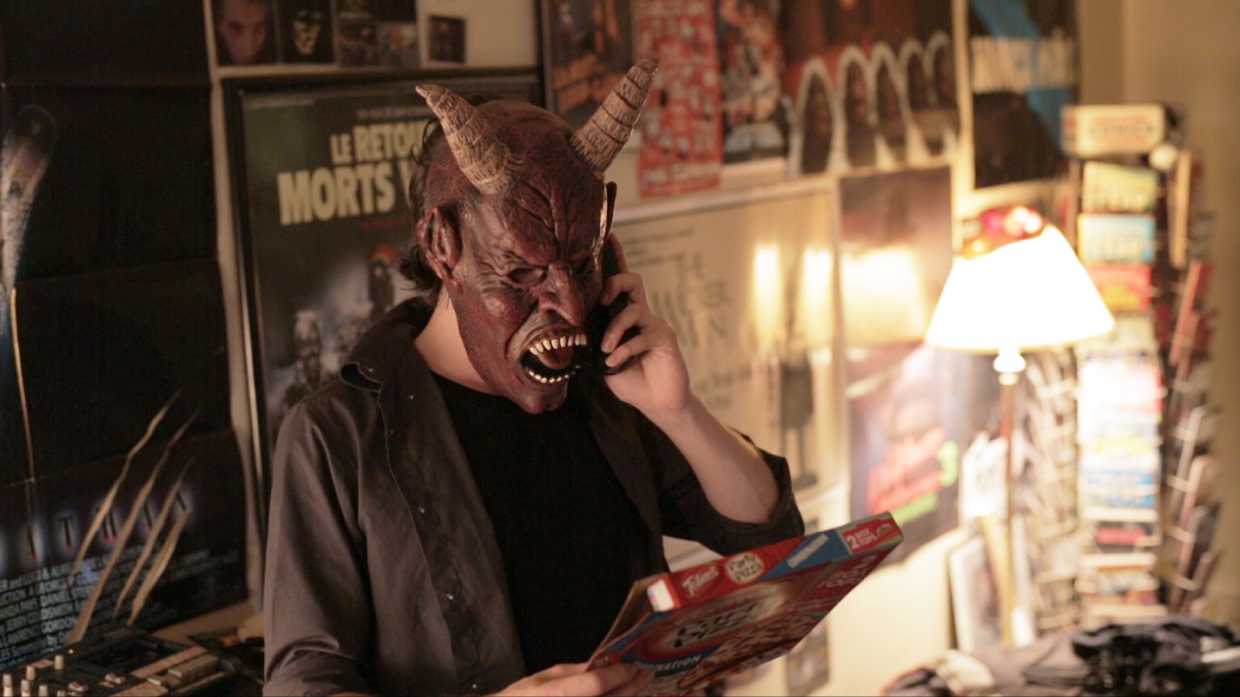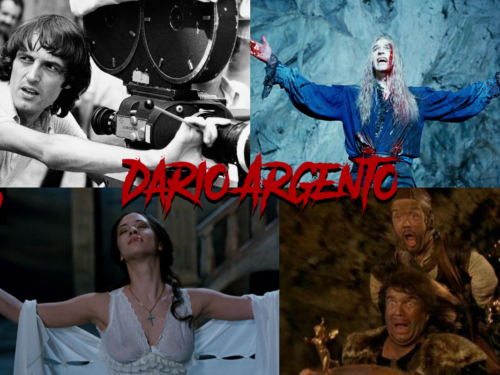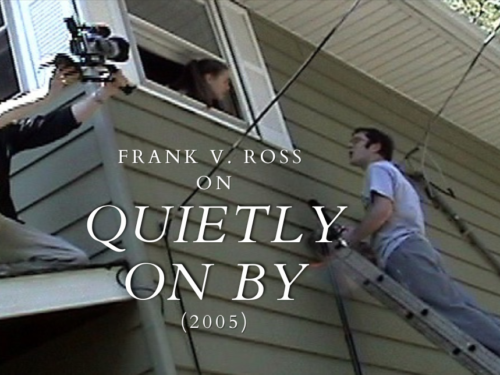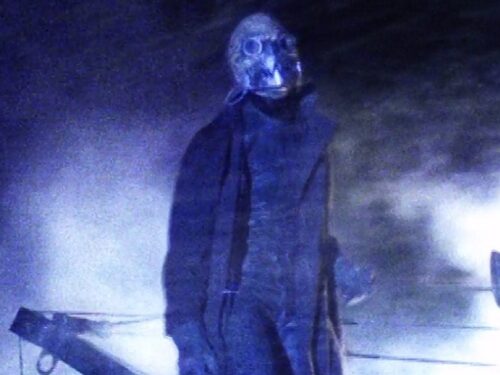Through his first four feature films, Potrykus has created his own unique, instantly recognizable kind of monster. In the first of a two-part series, Bennett Glace dissects the Chaotic Evil in Ape and Buzzard
Horror cinema doesn’t lack for stories of lonely, disaffected men. The genre’s rogue’s gallery is filled almost exclusively with outcasts, orphans and misfits. Some are misunderstood beasts. Frankenstein’s Monster, for example, doesn’t know any better when he tosses that girl into that pond. He only comes to understand his own abjection one film later, after bringing even more scrutiny onto his creator. His solemn “we belong dead” suggests the effect that monstrousness — both real and perceived — has had. He takes no joy in provoking terror. Rather, he dreads all the potential terror to come and takes himself out of the picture to avoid it.
Others are revenants, vengeful spirits emerging (often from the grave) to even the score. Freddy Krueger, Jason Vorhees, Michael Myers, they all relish spilling blood. We’re often meant to relish it too. That’s sometimes the result of a tragic, sympathetic backstory. Who could begrudge a killer like Candyman, to name one, his thirst for revenge? Other times, it’s because the killer’s victims are insufferable by design. Their world is corrupt, their behavior is consistently bad and, to a certain extent, we’re expected to cheer their demise. What good is a return to normality when normality sucks? It’s part of the reason the genre has the scuzzy reputation it does. It’s also part of why so many of these killers have become ubiquitous; they make us root for them in spite of ourselves and our better judgement. We do so even while knowing that any possible happy ending will see these monsters eliminated.
Through four features, Joel Potrykus has carved out his own unique niche in American independent cinema and created his own unique, instantly recognizable kind of monster. A pyromaniacal comedian, a petty scammer, a would-be necromancer and a childish gamer, they’d each have a lot in common even if Joshua Burge didn’t play three of them. All four stand with a foot in both of the groups mentioned above. Most isolate themselves to the extreme and each struggles with the torches and pitchforks of a loosely-defined ‘system.’ “We belong alone,” they seem to say. Each, too, holds a grudge. Their efforts are, at least in part, an attempt to fight back against a world that’s indifferent at its best and utterly inhospitable at its worst.

Reviewing The Alchemist Cookbook, Ignatiy Vishnevetsky writes that Potrykus’ strange young Michiganders are “too sympathetic to be called anti-heroes.” I have to agree. In isolation, they are nothing worse than “the monsters we like to imagine within ourselves when we feel down, out, angered and abandoned.” In a sense, they embody D&D’s Chaotic Neutral alignment, recently the stuff of countless memes. Fiercely individual, Potrykus’ characters doggedly pursue freedom in the face of a discouraging and dehumanizing world. The freedom to consume bagged snacks and analog entertainment is still freedom, after all. At home, they commit only victimless crimes and engage in fairly benign, mostly self-directed violence. They punish their own bodies relentlessly, but they never suggest a genuine desire to harm anyone else. It’s only the director’s first two leads that ever go out into that hostile world. In doing so, they ultimately realign themselves as Chaotic Evil characters. Given their affection for mysticism and the nerdier realms of popular culture, they might even appreciate seeing that distinction described this way.
Despite growing more and more physically monstrous, his characters have only become more sympathetic. Their obsessive pursuits and disgusting fates are the same, but their attitudes have changed. While Ape and Buzzard’s not-quite anti-heroes resemble scorned adolescents, The Alchemist Cookbook and Relaxer’s monsters are both more isolated and more pathetic. They instead resemble scared children, hiding rather than angrily locking themselves away. Their creator has matured with each new film, but they’ve made no such change. Instead of looking on in horror as they attempt to get back at ‘the system,’ we begin to hold out hope that they might find whatever personal freedom they’re looking for.
Chaotic Evil: Ape and Buzzard

Ape’s Trevor Newandyke (Joshua Burge) is largely an outlier among Potrykus’ protagonists. While his successors only ever socialize out of necessity, Trevor desperately, desperately wants to be liked. He’s a fixture at Grand Rapids, Michigan’s preeminent comedy club, a struggling artist who aspires to a familiar brand of fame and fortune. He’s ambitious, but that’s not what makes him unique in the Potrykus oeuvre. He stands out because his ambitions are both clearly defined and utterly conventional. A Steve Martin poster hangs in his dingy apartment and some of his deadpan one-liners betray Mitch Hedberg’s influence. Trevor knows exactly what he’s struggling toward. His goals aren’t anything like the nebulous “bigger things” Buzzard’s lead will stumble toward. In most other senses, though, he sets the standard that each subsequent protagonist will follow. He’s a desperate, mostly unsuccessful, striver who alternates between fruitless pursuits and aimless destruction.
Trevor’s desire for acceptance — and embarrassing failure to attain it — eventually make him Potrykus’ most credibly threatening protagonist. He lashes out after bad sets, tossing firebombs and leaving amateurish graffiti around nay-sayers’ houses. That’s not to mention the pyromania he indulges in private. With every disappointing set, he grows more violent and more desperate. Crowds grow more and more hostile. Soon he’s down to his last few dollars, struggling to afford his usual small Slurpee. Life begins to resemble even the more outlandish scenarios from his act. “I know if a snake offered me a Golden Apple,” he jokes, “I’d be out of there. Man, if I found out it was The Devil, I’d tell him to get lost. No deal.” Dragging the joke through another laughless minute, he concedes that he might be persuaded to take that deal for some “really cool VHS tapes.”
The Devil (Daniel Falicki, in a cheap Halloween costume) soon makes an appearance, hawking produce by the side of the road. Trevor strikes up a deal and purchases a “rare Golden Delicious apple” for the low price of one reheated joke. He holds onto the fruit and begins to regard it with spiritual significance. “It’s kind of a big deal,” he says, “Maybe it is magic. And if I eat it, I’m going to get special powers. Or maybe I’ll just die.” When he lets an audience goad him into wolfing it down, it’s no mystery which is more likely. A wound in his side begins to fester, his violent tendencies grow more extreme and the world begins to appear even more hostile.
Several embarrassments later, he snaps. He attacks an audience member and makes a deadly intervention in a domestic dispute next door. It’s as if he’s finally found suitable targets for the frustrations he harbors toward all hecklers and fellow hacks. The couple’s fights have echoed through the walls throughout much of the film. They become as constant and as maddening as the jeers that follow his sets. With his private and public lives blended, unable to find either isolation or recognition, Trevor becomes truly monstrous. He’s sacrificed his soul without gaining a successful career for his troubles. Returning to the club, the site of so much failure, he seizes the mic from his rival and finally delivers a rousing set. The thrill proves short-lived. Trevor’s elation turns to terror as a branch protrudes from his side. He has transformed into something monstrous, not super-powered but subhuman. Ape’s final shot, one of our only glimpses of the titular beast, suggests he’s changed yet again. His journey has taken him a step backward in his evolution.
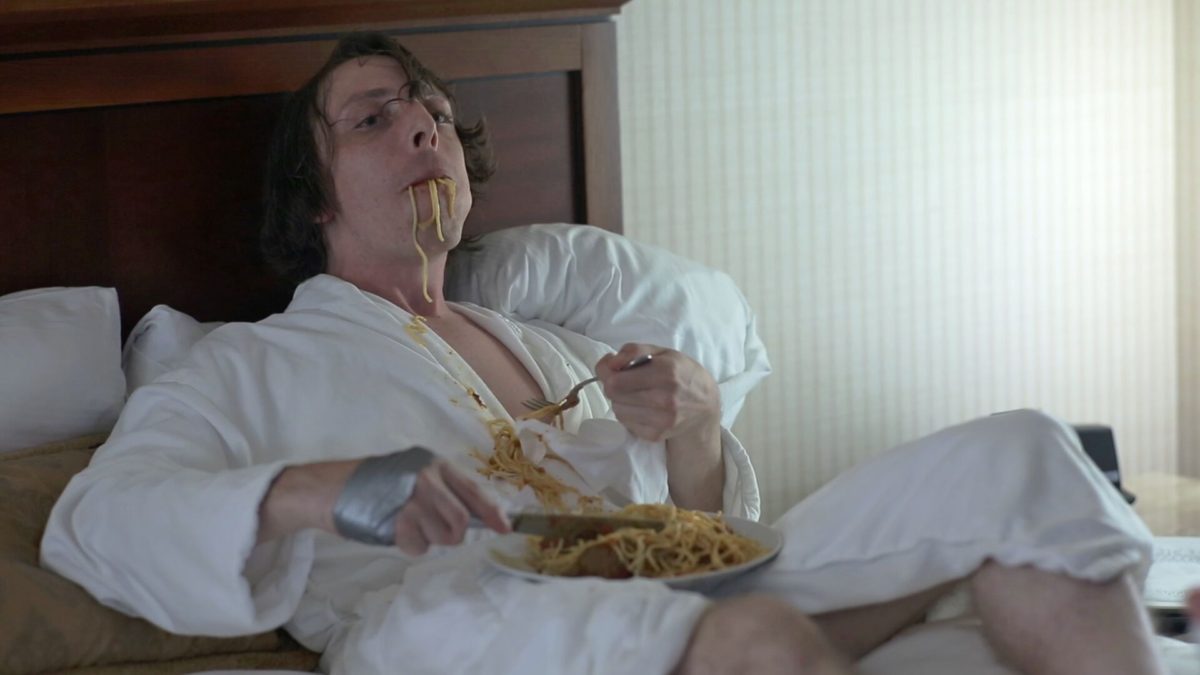
Early on in Buzzard, Marty Jackitansky (Burge, again) lives out another slight variation on one of Trevor’s jokes. The scene, funnily enough, completely undercuts one of his predecessor’s favorite punchlines. Topped with ranch dressing and Nacho Cheese Doritos, it turns out a Totino’s Party Pizza is really quite something. The unusual treat provides Marty more than caloric sustenance. It’s also a valuable tool in his effort to cheat every system possible and scavenge his way through life. He calls into Customer Service hotlines with bogus complaints to score free products. It’s just one of the many scams sustaining a comfortably impoverished lifestyle. Marty’s whole life looks a bit like Trevor’s act, just a slight variation on the comedian’s real life.
Marty’s apartment even looks a lot like Trevor’s. He’s got far more posters on his wall, but just one looms like an icon — Freddy Krueger. Our new protagonist is an even more zealous follower. Trevor admires Steve Martin, but he never goes on stage with an arrow through his head or approximates King Tut. Marty, on the other hand, risks arrest and bodily harm to mimic his role model. Modifying a Nintendo Power Glove, he creates a replica of Freddy’s famous handheld blades and sharpens them while his poster looks on in approval. The glove serves as his most powerful weapon against the establishment, its rules and its stifling sense of order. Well before it spills blood, it helps Marty style himself (in his mind, at least) as a scheming “night stalker.”
The connection to that humorous and strangely appealing horror icon is fitting. Like Freddy, Marty is at once totally repellant and totally compelling. Credit Burge’s peculiar charisma and Portykus’ deft evocation of a drab, workaday Hellscape. We’re as deeply immersed in Marty’s countless frustrations as his rare moments of pleasure. Potrykus forces us to sit within the sweaty, uncertain seconds before a scam comes together. He also invites us to share in the pleasures of a hotel robe, a plate of pasta and cable. We can’t help but support Marty in his many battles against the system. His struggles are just that harrowing, his relief that cathartic. At the very least, we begin to wonder how he’ll pull off the next ‘big’ job, much the same way we wonder how Freddy (or Jason, or Michael Myers) will pick off the next teenager.
Marty’s complaints are definitely half-baked. They’re the sort of rambling rants we’ve all heard from dozens of real-life Martys. We’ve all probably delivered a few ourselves in moments we look back on in embarrassment. It eventually becomes clear, however, that there are several systems at play in Buzzard, each one posing a credible threat to Marty’s livelihood. On the phone with Hot Pockets, he learns he’s “already in the system.” They’ve got his name and number; they’re wise to his tricks. It frightens him. It should frighten the viewer too. With one fewer petty scam on the table, Marty becomes increasingly desperate, even dangerous. When he takes a turn for the genuinely criminal, he’s quickly thwarted by yet another system. Check fraud, his boss (Teri Ann Nelson) ensures him, isn’t possible. “The system,” which captures photographs of every check, makes any illegal transaction worthless. It’s this realization that forces Marty to hide out and eventually hit the road.

What’s most disturbing about these various systems is that they’re so often maintained by people who ought to be Marty’s comrades. One scheme, returning unused office supplies for a profit, is derailed by another greasy-haired, minimum-wage employee. Later, Marty loses his last few bucks to a scheming, fast-talking convenience store cashier. Both sequences make it clear that Marty’s paranoia isn’t totally unfounded. The forces that he fears are out there. Worse still, they’re often disguised as someone just like him.
Buzzard’s climactic sequence, a reversal of its triumphant opening scam, sees Marty and ‘the system’ both operating at their infuriating worst. Attempting to cash five checks at once, Marty alerts the attention of Craig (Joe Anderson), a by-the-books Detroit bank manager. He calls the police before calling Marty into a back room. Our hero, so assured throughout the film’s early stretch, reaches a stuttering nadir. He goes into his most spirited and incoherent rant yet. Tossing Marty’s (admittedly, jejune) complaints about “corporate thievery” back at him, Craig comes off like the sort of smirking Company Man that every office drone dreams of flipping the bird. He’s not much farther up the food chain than Marty’s buzzard, but he uses their confrontation to chest-thumpingly play the part of an apex predator. “I’ve seen people snatched for some stupid-ass $200 scam,” he gloats, “But, man, you’ve only got $90 worth of checks here.” He’s Marty’s perfect self-righteous foil. Clinging to needless, bureaucratic procedure the way Marty clings to his checks, he gives the system a voice. Their confrontation gets ugly fast. They trade insults, threats and eventually blows. The system, it seems, has made monsters of everyone in the middle.
Still, Potrykus knows well enough not to let his hero fly away without consequence. Like Trevor, his final triumphant moments are immediately undercut with shock and ambiguity. Racing down the sidewalks of Detroit, carefree for the first time in days, Marty happens upon a storefront full of televisions. He’s being watched. Maybe he has been all along. It’s only a matter of time before the system intervenes and puts an end to his scavenging.
Pt 2: Joel Potrykus’ Midwestern Monsters in Alchemist Cookbook and Relaxer
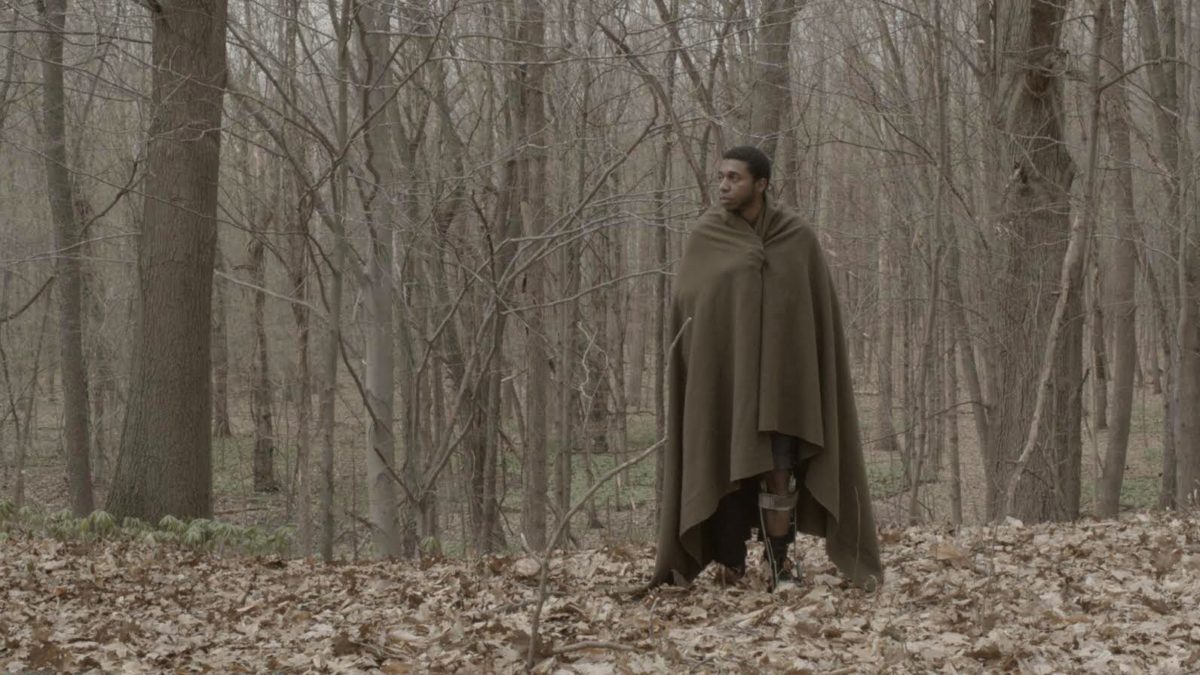
Find the complete October Horror Archive here:

Follow our list of the 31 Days of October Horror on Letterboxd
(Split Tooth may earn a commission from purchases made through affiliate links on our site.)

